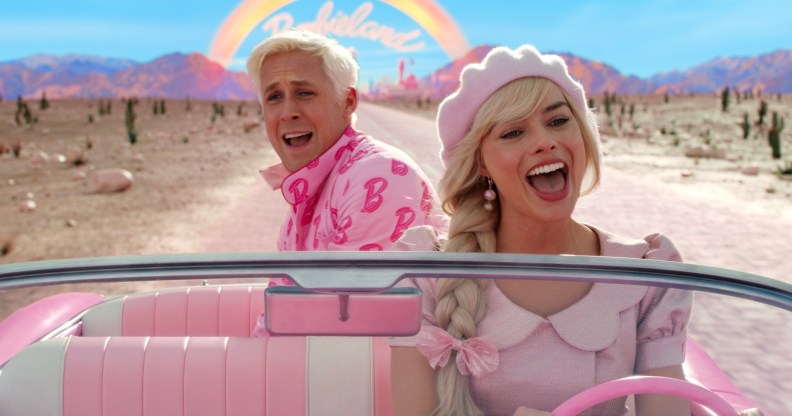Barbie release delayed in Middle East amid reports of LGBTQ+ censorship battle

Ryan Gosling as Ken (L) and Margot Robbie as Barbie (R) in Greta Gerwig’s Barbie. (Warner Bros. Pictures)
The release of Greta Gerwig’s blockbuster hit Barbie has been delayed in the Middle East, reportedly amid a censorship battle over perceived LGBTQ+ content in the film.
Middle Eastern theatre chain Vox Cinemas has confirmed that the film’s release has been pushed back from its initial release date of 18 July to 31 August.
A source has told Variety that the delay is a result of censor requests that LGBTQ+-themed content be cut from the film for its Middle East release. The publication notes that the requested cuts are unlikely to be approved by the Warner Bros. studio, which could result in the film being banned completely in some countries in the region.
Saudi film platform Movsto posted a tweet on Sunday (30 July) confirming that the film would not be shown in Saudi Arabia, Kuwait, Qatar, the UAE, Egypt and Bahrain.
However, a later tweet posted on 4 August suggested that UAE officials had agreed to show the film on 31 August.
While Barbie features several prominent LGBTQ+ actors including Hari Nef and Kate McKinnon, there is not much in the way of overt LGBTQ+ content – though LGBTQ+ subtext and queer-coded moments do feature.
While puzzling, the reportedly censorship demands are perhaps not unsurprising, given that previous direct-to-video Barbie releases have been banned in Saudi Arabia due to their portrayal of women in clothing and roles that do not align with the country’s strict conservative values.
Regional cuts are commonplace in Hollywood films that make their way over to the Middle East. Studios that fail to comply with cuts demanded by officials in the country are often banned entirely.
One of the more notable examples was the recent controversy surrounding the Toy Story spinoff Lightyear, which was banned from 14 countries after Disney refused to cut a same-sex kiss from the film.
UAE’s Media Regulatory Office announced on Twitter in June 2022 that it was to ban Lightyear from public screening due to a “violation” of the country’s media regulation laws, which prohibit content promoting “sexual activity outside of different-sex marriage.”
The same-sex kiss scene itself barely made it through the cutting room floor during the film’s production, only surviving through backlash from Pixar staff members.
LGBTQ+ Pixar employees accused Disney of cutting “nearly every moment of overtly gay affection” from their films in a March 2022 open letter.
In response, Disney executives reportedly reinstated the same-sex scene, in which the character Hawthorne kisses her same-sex partner.
Actor Chris Evans, who plays Buzz in the film, said he was happy to see the return of the kiss, but was “frustrated” that its inclusion had become a “topic of discussion” for Disney.
“The goal is that we can get to a point where it is the norm, and that this doesn’t have to be some uncharted waters, that eventually this is just the way it is,” he told Variety at the time. “That representation across the board is how we make films.
“Look, it’s an honour to be a part of something that is taking those steps, but the goal is to look back on this time and just be shocked that it took us this long to get there.”
How did this story make you feel?

